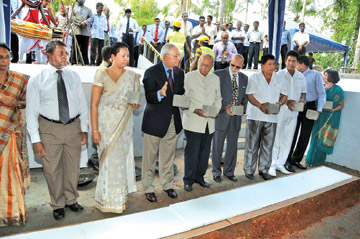New scientific institute for world-class scientific research
The present world market is in a fierce competition over selling
goods and services. For Sri Lanka to be on par for many years specially
in promoting value added products, a dire demand surface to infuse
innovative technology to make our products and services more of high
quality.
To fulfill this need the Government initiated constructing the
country's first Science park. Located at Pitipana in Homagama on a 50
acre land the construction work started last Thursday (June 28) bringing
hope for a future strengthened with knowledge. This would be one of the
most ambitious development projects in the science and technology field.
 The vision is to make Sri Lanka a leader in knowledge creation and
innovation in Asia by establishing a viable eco-system for world class
scientific research and technological advancement. A strong commitment
is imperative in achieving such a target - both from the government and
the science community. The vision is to make Sri Lanka a leader in knowledge creation and
innovation in Asia by establishing a viable eco-system for world class
scientific research and technological advancement. A strong commitment
is imperative in achieving such a target - both from the government and
the science community.
"This is an initiative that has been pursued by SLINTEC which is a
private-public partnership, which I believe is the first of its kind in
the field of science and technology," said Secretary to the Ministry of
Technology and Research Dhara Wijayatilake.
Talking about the SLINTEC (The Sri Lanka Institute of Nanotechnology
(Pvt) Limited) Wijayatilake said that it is a model that is being
watched by Government and no doubt the private sector to work in harmony
with Government on ambitious development projects.
"This will be phase 1A of a four phase plan the SLINTEC has drawn for
the science park. I believe we have every right and perhaps an
obligation to be ambitious on behalf of the scientific community," she
added.
The plan is to complete the phase 1A of the science park project by
July 2013, according to Wijayathilake.
Accordingly, it will be a centre for research and investment which
will include a state-of-the-art laboratory and infrastructure that will
certainly support the scientific community of the country as well as
industry," she said. Accordingly the first phase will be fully funded by
the government.
"Being funded by the Government signifies not a mere commitment to
provide funds for an infrastructure development project, but it is
valued as an acceptance at the highest level of the Government that
Research and Development in the field of science and technology does
play a vital role in the macro national development agenda.
This is also evident by the many concessions that have been granted
in the 2012 budget for those who engage in research and development
initiatives," Wijayathilake said.
She also said that it is now the responsibility of SLINTEC to ensure
that acceptance has validity by focusing on efforts that will produce
results that are relevant to our development.
The total cost of the phase 1A will be around Rs. 829 million which
is fully funded by the government. This is a magnificent step in
upgrading the science field as historically the Gross Domestic
Expenditure on Research and Development has been around 0.15-0.2 p.c. of
GDP.
SLINTEC has sought as many as seven patents in areas including smart
fertiliser, mobile phone based health services, carbon nanotubes from
vein graphite available here that are 100 times stronger than steel and
nanotechnology based tires.
The new science park will provide a space that will translate the
scientific findings into business, said Professor Ajith de Alwis,
Chairman of the National Nanotechnology Committee under the National
Science Foundation. "The research and development field is embracing
nanotechnology and we are still not too behind the world.
As Professor de Alwis said, with concepts like science park Sri Lanka
is actually incorporating a triple helix model in which includes the
state, industry and the universities together. "There are number of
scientific and technological innovations in the country.
Yet as there had been a lack of interconnectivity among these
researchers or their organisations with the state and business sector
most of those findings never really got the best results it expected,"
said Prof. De Alwis. Thus, the new concepts in linking the scientific
community, state and the industries will be a frog leap for the
betterment of the science field and eventually strengthen the economy of
the country.
As an example, the technology of the slow release fertiliser
innovated by scientists of the SLINTEC was purchased by a leading Indian
Fertiliser company at a value of nearly Rs. 3 million.
"The investments made on research and development will not show
immediate profits like in exporting raw products like tea or as in
tourism. But the return the country will get from technological
innovations will exceed any of these profits and that profit is viable
for a longer period of time," he added. Advanced industrial economies
around the world are steadily moving to the unprecedented position where
knowledge based industries and knowledge based organisations will within
the foreseeable future generate more than half of their total GDP and
total employment.
At this time in the history when Asia is becoming a formidable
economic power we too should recognise the importance of science,
technology and innovation in fuelling a national economy.
To raise Sri Lanka to developed status this Science and Technology
Policy along with others must be integrated with other inputs such as
infrastructure (transport, telecommunications, power, etc.), a fair and
efficient legal system, including law enforcement, and above all peace
and security.
National development can only truly be achieved in an atmosphere in
which individuals have faith in the system and feel comfortable
investing in productive enterprises.
|

